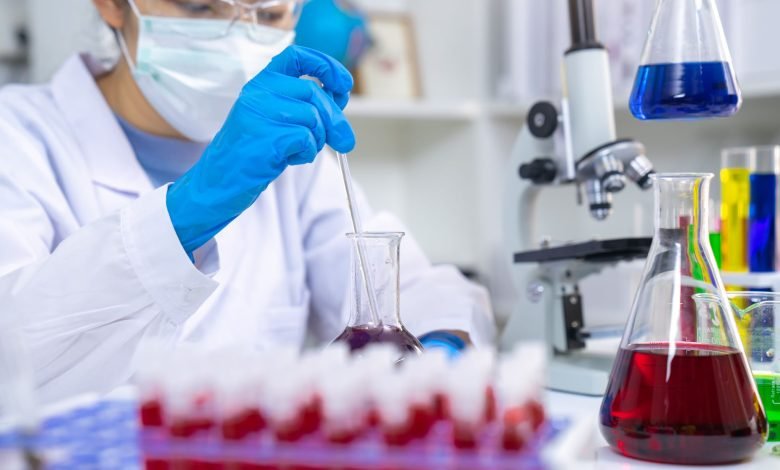What is Real-Time Quantitative PCR (qPCR)?

Both PCR and qPCR are techniques that are used to amplify DNA in biotechnology for various reasons. In this article, we will explore the differences between the two since many tend to mistakenly think of them as synonymous. Of course, they have some similarities, but the differences outweigh them.
PCR stands for a polymerase chain reaction, while qPCR stands for digital PCR or real-time PCR. While you might be familiar with PCR, you might not know the details of qPCR yet. So, let’s start with:
What is qPCR?
qPCR is a technique in biotechnology through which you can detect, characterize, and quantify nucleic acids. In short, you not only determine the presence or absence of the DNA, but you also quantify it. You can use qPCR to detect and quantify both DNA and RNA. With RNA, you need to follow a simple trick. The RNA first has to be reverse transcribed into a cDNA sample. This method is known as RT-qPCR.
You must also remember that qPCR is known as real-time PCR because it quantifies the DNA produced through each cycle of the amplification process. Thus, the quantification can be said to have been done in “real-time.”
How each step is quantified separately is through the use of fluorescent dyes for each cycle. SYBR Green is the most common type of dye used to measure the amplicons. The amplicons are measured during the exponential phase of the polymerase chain reaction when the amplification actually happens.
Some scientists find the use of only one dye limiting because only one kind of product in the DNA sample can be quantified. However, qPCR still gives you more information than regular PCR.
So, now that you know what qPCR is, let’s get straight into the differences between PCR and qPCR.
Differences between PCR and qPCR:
- The primary difference has already been stated above. While PCR is a qualitative process, qPCR is a quantitative process. PCR is used to determine the presence of the DNA, whereas qPCR is used to quantify the amplicons during each cycle of the exponential phase in PCR.
- This is not as much a difference as it is a major misconception. When RNA is used in the PCR process, it is known as RT-PCR. But this must not be confused with qPCR because “RT” in the previous technique stands for “Reverse Transcription” and not “Real-Time” (as qPCR is also known). As stated before, RT-qPCR refers to the technique of using RNA during qPCR.
- In PCR, a selected sequence of DNA is amplified. The selection process needs to be done only once before the amplification begins. This selected sequence is detected through agarose gel electrophoresis. But in qPCR, this detection doesn’t just have to be done once. It has to be done during each cycle of amplification. This detection in qPCR is done through the SYBR Green dye commonly.
- Conventionally, PCR is considered to be a low-resolution amplification technique, compared to qPCR. Conversely, qPCR is known as a high-resolution, quantitative amplification technique that also requires greater expertise than simple PCR.
- For PCR, the results are obtained after the entire amplification process is complete. However, in qPCR, data has to be collected in real-time throughout the exponential phase. QPCR is performed with the intent to find out how far the DNA has been amplified through each cycle.
- Of course, this means that the results obtained through qPCR are way more detailed than the results obtained through PCR. Thus, the resolution is extremely low in PCR as compared to qPCR.
- The dyes used for them are very different. Ethidium bromide is used during PCR, whereas fluorescent dyes like SYBR Green are used during qPCR.
- Strangely enough, though qPCR produces more detailed results than PCR, qPCR is easier to carry out – and takes less time overall – than PCR.
Despite the numerous differences, there are still a few similarities between them. Let’s explore what these are.
Similarities between qPCR and PCR:
- The process of amplification of a DNA or RNA sequence is carried out in both of them.
- The core principle behind both is still the polymerase chain reaction.
- When RNA is used in both qPCR and PCR, reverse transcription has to be performed before it can be used.
- Both PCR and qPCR are techniques based on the principle of temperature-regulated amplification.
What are the Real-life Uses of PCR and qPCR?
PCR, as you might have already guessed, is used in various fields where only a small trace of DNA can be obtained. In forensics, for example, PCR is widely used to amplify the amount of DNA found at crime scenes so that it can be used later to obtain DNA matches. Trace DNAs need to be used for this purpose. The same is valid for the field of archeology, where only trace DNAs of ancient organisms can be found from the excavation sites.
However, qPCR is used for slightly different purposes. Here, amplification isn’t the ultimate end goal; quantification is. qPCR is extensively used in the Genetically Modified Food industry to find out the quantity of genetically modified organisms in the food sample. It is also incredibly important in cancer research and treatment because it is required in cancer phenotyping. Gene expression analysis in biotechnology also requires qPCR.
In Conclusion
If your end goal is amplification, you are going to need PCR. However, if you need to find out how far the amplification has happened, you should make use of the qPCR technique instead.
Pondering upon the comparison between the merits and demerits of the two processes would prove to be a futile endeavor since these have very different real-life uses. Scientists use whichever process they need for a specific experiment depending upon the ultimate goal of that experiment.





